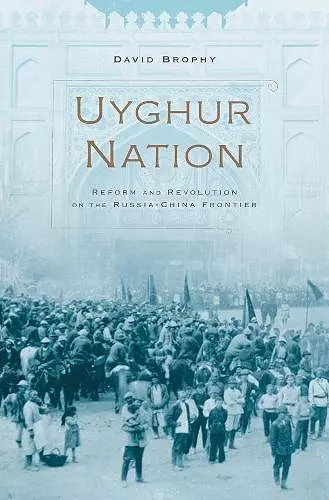Uyghur Nation
Reform and Revolution on the Russia-China Frontier
Format:Hardback
Publisher:Harvard University Press
Published:28th Apr '16
Currently unavailable, and unfortunately no date known when it will be back

The meeting of the Russian and Qing empires in the nineteenth century had dramatic consequences for Central Asia’s Muslim communities. Along this frontier, a new political space emerged, shaped by competing imperial and spiritual loyalties, cross-border economic and social ties, and the revolutions that engulfed Russia and China in the early twentieth century. David Brophy explores how a community of Central Asian Muslims responded to these historic changes by reinventing themselves as the modern Uyghur nation.
As exiles and émigrés, traders and seasonal laborers, a diverse diaspora of Muslims from China’s northwest province of Xinjiang spread to Russian territory, where they became enmeshed in political and intellectual currents among Russia’s Muslims. From the many national and transnational discourses of identity that circulated in this mixed community, the rhetoric of Uyghur nationhood emerged as a rallying point in the tumult of the Bolshevik Revolution and Russian Civil War. Working both with and against Soviet policy, a shifting alliance of constituencies invoked the idea of a Uyghur nation to secure a place for itself in Soviet Central Asia and to spread the revolution to Xinjiang. Although its existence was contested in the fractious politics of the 1920s, in the 1930s the Uyghur nation achieved official recognition in the Soviet Union and China.
Grounded in a wealth of little-known archives from across Eurasia, Uyghur Nation offers a bottom-up perspective on nation-building in the Soviet Union and China and provides crucial background to the ongoing contest for the history and identity of Xinjiang.
This work on the Uyghurs, a 10-million strong Turkic Muslim minority residing mainly in Xinjiang in western China, is a welcome contribution to a recent rise in Uyghur studies…A remarkable account of a people searching for identity at the intersection of empire. -- M. Chakars * Choice *
Nothing I have read in the last fifteen years comes close to this work in terms of intellectual breadth, rigorous analysis, and contribution to the field. This book will not only revolutionize thinking about the history of the Uyghur nation and the political history of Xinjiang during this period, it will set a new bar for future scholarship and inspire readers to think again about the processes, challenges, and opportunities within shifting political landscapes that lead to the creation of nations. -- Laura Newby, University of Oxford
Drawing on sources in several languages, this book demonstrates how the idea of a Uyghur nation emerged in the late nineteenth and early twentieth centuries. Brophy shows how intellectuals in Taranchi and Kashgari communities along the Xinjiang–Russian border, inspired by academic writings on ancient Uyghurs, negotiated a new concept of Uyghur identity. This study is a valuable contribution to our understanding of the Uyghur national idea, and to Central Asian and Xinjiang studies. -- Ablet Kamalov, Institute of Oriental Studies, Almaty, Kazakhstan
Uyghur Nation breaks new ground in the study of modern Xinjiang. David Brophy takes a transnational approach to the formation of a ‘Chinese’ ethnic group, offering a convincing account of the impact of tsarist and particularly Soviet institutions, evolutions, and interventions on the Qing and then Republican Chinese frontiers. He also demonstrates that the idea of a Uyghur nation had a conflicted, cross-border, twentieth-century history. Perhaps most important, he unites political, intellectual, social, religious, even economic history to create a story rooted in local conditions, not simple national or ethnic categories. He has written a strikingly original and impressive book. -- Jonathan Lipman, Mount Holyoke College
In Uyghur Nation, Brophy transforms our understanding of the history of the Uyghurs. At the center of Brophy’s attention is the question of how the Muslims of Chinese Turkistan came to imagine themselves as Uyghur. He traces the emergence of Uyghurist discourse by placing Uyghur history firmly where it belongs—in the very center of Eurasia at the crossroads of three empires. Brophy relates the emergence of Uyghurist discourse to developments in Muslim societies of Xinjiang and beyond as they came to terms with pressures and influences from the Qing, the Russian, and the Ottoman empires. Prodigiously researched across many archives and in multiple languages, Uyghur Nation is a major work of transnational history that deserves a wide readership. -- Adeeb Khalid, Carleton College
David Brophy’s Uyghur Nation offers a fresh perspective on Uyghur history by using Russian, Chinese and Turkic sources to chart the development of the discourses that would ultimately produce the modern Uyghur identity… What is remarkable is that a ‘palimpsest of Islamic, Turkic and Soviet notions of national history and identity’ created by activists outside Xinjiang could have resonated so widely among Xinjiang’s diverse population. In this respect, the Uyghur case is probably unique, and David Brophy’s book thus deserves to be read by anyone with an interest in nation-building. -- Nick Holdstock * Times Literary Supplement *
- Short-listed for CESS Book Award 2017
- Nominated for Joseph Rothschild Prize in Nationalism and Ethnic Studies 2017
- Nominated for Jerry Bentley Book Prize 2016
- Nominated for ENMISA Distinguished Book Award 2018
ISBN: 9780674660373
Dimensions: unknown
Weight: unknown
368 pages